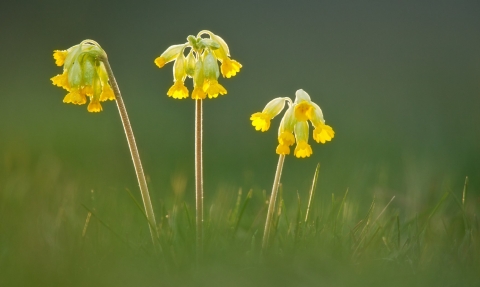
Cowslips (Primula veris), Catcott, Somerset - Guy Edwardes/2020VISION
UK wildlife law
What is a wildlife crime?
A wildlife crime is any action which contravenes current legislation governing the protection of the UK’s wild animals and plants.
Theft or disturbance of wild birds, their eggs and/or nests
All British birds, their nests and eggs are protected under the Wildlife and Countryside Act 1981, however some 'pest species' can be controlled under certain conditions by authorised people, such as crows or pigeons.
It is illegal to disturb birds during nesting season or to take wild eggs from a nest, for sale or as part of private collections.
Cutting hedges and trees
The cutting and pruning hedges should always take place outside of the main breeding period (between September and February). It can be a criminal offence if a nest or bird is harmed.
Theft or disturbance of wild animals, plants or habitats
It is an offence to kill or injure any wild animal listed in Schedule 5 of the Wildlife and Countryside Act 1981, and it is also an offence to intentionally or recklessly damage or obstruct any place used for their shelter or protection. Some of the species protected under this are red squirrels, bats, water voles, sand lizards and natterjack toads.
The Act also makes it an offence to intentionally uproot any wild plant without the permission of the land owner and sell on the plants.
Poaching and coursing
Hare coursing is one of the most common examples of illegal poaching, with dogs used to flush out hares. Signs to look out for if you suspect individuals of deer, hare or badger poaching, are a group of vehicles parked at night in a rural area (by a gateway to a farmland, on a grass verge, on a farm track) which may show evidence of dogs inside. Other indications are suspicious looking road kill or the discovery of bait, traps and snares.
It's not just game that are covered under this. Fishing without a license in private fisheries or rivers is also a poaching offence.
Illegal wildlife sport
As a result of the Hunting Act 2004, it is now illegal to hunt for a wild mammal with a dog, unless the hunting is exempt. The hunting of rats and rabbits is also illegal unless it is carried out by the landowner or with his written permission.
Some activities which may appear to be hunting, but are not in breach of the Act, include trail hunting, hound exercising and flushing to guns.
Animal cruelty
All British wild mammals are protected from deliberate acts of cruelty under The Wild Mammals (Protection) Act 1996. Police will often liaise with the RSPCA and RSPB to aid prosecution of animal and bird offences.
Lethal control is only permitted under a general license and it is advisable to check with DEFRA for advice on dealing with 'pest' species. If you suspect illegal use of pest control measures then please report to the police, or anonymously with Crimestoppers.
Raptor persecution
Birds of prey can be targeted due to the perception that they are pests, interfering with crops, farm animals and the breeding of game. They're often targeted and killed illegally with traps, poison or by shooting.
It is an offence for any person to intentionally kill, injure or take any wild birds, however not all traps are illegal so it can be difficult to tell if you find one. Interference with legally set traps or snares is an offence so do not touch them.
Badgers and the law
Despite being protected under The Protection of Badgers Act (1992), badgers still suffer persecution from those using dogs to dig them from their setts. If you are aware or suspicious that an active sett has been disturbed, please report it. Signs to look for are recently moved earth, human/dog footprints, blood or fur around the sett or objects blocking the entrances to the sett.
Bats and the law
For all bats, their breeding sites and resting places are specially protected by the Conservation of Habitats and Species Regulations 2010 and the Wildlife & Countryside Act 1981. If bats are roosting in roof spaces it is unlawful to disturb or move them. Natural England can provide advice on bat mitigation licences if you need to disturb a bat roost.
